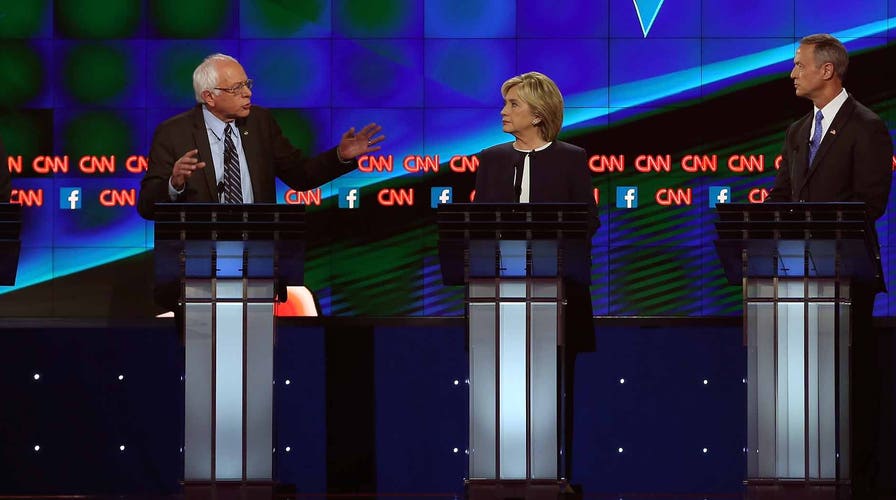Dem debate: Winners and losers
The first Democratic presidential debate of 2016 is in the book. Here to break it all down is LIBRE Initiative’s Marilinda Garcia, and Basil A. Smikle Jr. of the NYS Democratic Party.
Las Vegas, Nev. – In the first Democratic debate in the 2016 presidential race, the five candidates expressed support for comprehensive immigration reform, with some saying that they would go further than President Barack Obama in using executive action to spare undocumented immigrants from deportation until Congress comes up with permanent relief.
Secretary of State Hillary Clinton, the front runner, and former Maryland Gov. Martin O’Malley, both said they would extend relief from deportation to even more immigrants than Obama’s executive orders now cover. (Some of his actions have been on hold pending court battles.)
Clinton noted that she has paid particular attention to the plight of undocumented immigrants brought to the United States as minors – known as Dreamers -- since early this year.
“I came to Las Vegas in early May and met with a group of Dreamers,” Clinton said, adding that she wishes others could meet such young people with major potential. Clinton has hired Dreamer leaders who were formerly undocumented to work on her campaign.
O’Malley flashed his pro-immigration bona fides in the first minutes of the debate, saying that under his leadership as Maryland governor, the DREAM Act -- which allowed undocumented students to attend public colleges at in-state tuition rate – became law.
“We need to understand that our country has been made stronger in every generation by immigrants,” O’Malley said.
U.S. Sen. Bernie Sanders, who has been doing well in polls – usually coming in second to Clinton, and drawing large crowds on campaign stops -- was asked about his opposition to expanding the guest-worker program, a position that has been criticized by some advocates of more lenient and generous immigration policies.
Sanders said he opposes it because it allows for exploitation of foreign workers.
“If they stand up for their rights,” Sanders said, “they’re thrown out of the country.”
“You need comprehensive immigration reform, you need a path to citizenship, you need to bring people out of the shadows.”
But during the two-hour debate, moderated by CNN anchor Anderson Cooper, references to Latinos and to immigration were few.
O’Malley and Sanders made references to Latinos in their introductory remarks at the start of the debate.
O’Malley spoke of the Dream Act in Maryland, and Sanders assailed what he saw as a society that does not offer enough opportunities to black and Latino youths.
“African-American youth unemployment is 51 percent. Hispanic youth unemployment is 36 percent," Sanders said. "It seems to me that instead of building more jails, providing more incarceration, maybe, just maybe, we should be putting money into education and jobs for our kids.”
Many political experts had expected more attention to be focused to Latinos, given that the debate was in Nevada, a battleground state where this growing voting bloc could play a pivotal role.
While the candidates seemed to agree on immigration, Clinton and Sanders clashed over U.S. involvement in the Middle East, gun control and economic policy, outlining competing visions for a party seeking to keep the White House for a third straight term.
And though the five candidates took issue with each other, they also repeatedly sounded traditional Democratic themes - such as fighting income inequality - that are sure to carry over to the general election campaign against the Republicans.
The debate was seen as a night for front runner Clinton to show Americans a different side than the one that has dominated headlines. Experts said she needed to show warmth, sincerity and draft another narrative to take the spotlight off the one that has framed her as icy, self-serving and making end-runs around rules.
For Sanders, experts said the debate was a chance to introduce himself to Americans who had never directly heard from him, or who may have known him primarily as the socialist-leaning candidate.
The others – O’Malley, Chafee and Webb -- needed even moreso to introduce themselves to Americans.
The slate of Democratic candidates is generally older than the GOP one.
Sanders is 74, the oldest of all the candidates in both the GOP and Democratic party who is running for president. Clinton is 67, Webb is 69 and Chafee is 62. O'Malley, 52, is the youngest of the Democrats.
Vice President Joe Biden, who has not yet announced whether or not he will enter the race, is 72.
The Democratic party has come under fire – by some Democrats themselves – for opting to have only six sanctioned debates.
The Associated Press contributed to this report.
Like us on Facebook













































